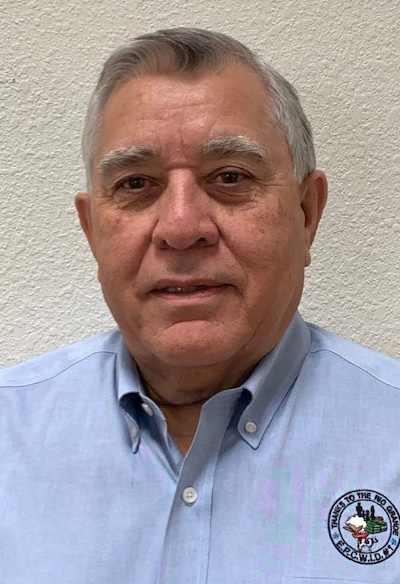Years working in irrigation: Lifelong
Years as manager: 16
Number of employees: 108
Size of service area in acres: 69,010
Amount of water diverted for irrigation per year in acre-feet: 370,000
Main crops irrigated: Pima cotton, pecans, alfalfa, winter onions
Predominant irrigation methods: Flood
 Irrigation Leader: What is the top issue facing your irrigation district today?
Irrigation Leader: What is the top issue facing your irrigation district today?
Jesús Reyes: The top issue is that we’ve been in and out of drought since 2002. We have been trying to conserve water when we have plenty. In 2008, we worked out an operating agreement with our sister irrigation district, Elephant Butte Irrigation District in New Mexico. The Bureau of Reclamation signed an operating agreement that allowed us to use any water we conserve during one irrigation season in the following season. Any water we conserve in El Paso is carried over and left at the dam. We have that water as if in a savings account. I’ve also been lining canals with concrete to deliver water into our farmers’ ditches more efficiently and upgrading our headgates.
Irrigation Leader: What future issues are you preparing for?
Jesús Reyes: There are predictions that because of climate change, the Rio Grande valley will become even drier as the years progress. That’s concerning, because the El Paso area has always been a farming community. We’re trying to do everything we can to conserve and to upgrade our system to make it more efficient.
Irrigation Leader: What are your top issues regarding personnel?
Jesús Reyes: We’ve been lucky in that our board of directors has been supportive of our staff. For the past 10 years, the board has approved pay increases of 3.5 percent on an almost yearly basis and pays for health insurance for our employees. We have a great working relationship with our five board members and trust them greatly.
Irrigation Leader: What kind of training do you currently provide your employees?
Jesús Reyes: I encourage staff—not just management staff, but people who work in telemetry, safety, and other fields—to go to seminars to get training and get ideas from different areas of the country. I cross train them as much as I can on different issues. And of course, I’m always reading Irrigation Leader. Sometimes I make copies of specific articles for management staff so that they see how managers in other irrigation districts throughout the country are operating.
Irrigation Leader: How much do you spend on training for your employees each year?
Jesús Reyes: We have an education and training budget of about $30,000.
Irrigation Leader: What is the most important thing you have learned as manager?
Jesús Reyes: The most important thing is to take care of your employees. They’re the ones who are out there actually doing the grunt work and working in the heat and the elements. I’m trying to teach my first line of management to take care of the employees underneath them, to make sure they have what they need to continue operating the district, and to treat everybody with respect.
Irrigation Leader: What are the top skills needed to be successful manager?
Jesús Reyes: Being open minded and trying different ideas. I don’t go to a lot of conferences, but I do target some, like the one Water Strategies hosts in Phoenix every year. I try to attend that one and take one of my assistants with me, usually my water master. I attend the National Water Resources Association conferences. I target conferences where I can visit with other general managers and pick up different ideas.
Jesús “Chuy” Reyes is general manager of El Paso County Water Improvement District No. 1 in El Paso, Texas. He can be reached at jreyes@epcwid1.org.
